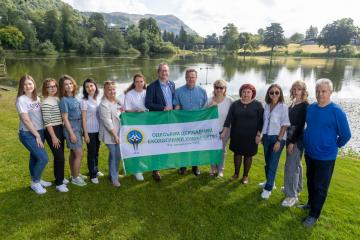
Stirling University welcomes Ukrainian academics in water initiative
Ukrainian academics are visiting the University of Stirling as part of a joint research project on what can be done to improve water quality in the warn torn country. Experts from the University of Stirling developed a satellite system which can monitor water quality remotely, which the Ukrainian academics are studying. Over the course of a two-week visit, the delegation from Ukraine are carrying out experiments in Stirling’s laboratories as well as Loch Lomond, to develop ways they can implement the technology to their water quality at home. The Ukrainian academics have come over from Odesa State Environmental University, an institution specialising in the protection and monitoring of the environment in the Black Sea port city of Odesa. Ukraine’s vital water infrastructure has been destroyed by ongoing Russian attacks, including the Kakhovka Dam and hydroelectric power plant, which supplied drinking water and water for agricultural land and was also a major energy producer. Waters are also being contaminated by the damage done through Russian attacks to water pumping stations, purification plants and wastewater treatment facilities. Read more: Russia targets Odesa again but Ukraine says all missiles and drones shot down On Sunday night, the city of Odesa was hit with two waves of Russian attacks - which included a total of 15 drones and eight Kalibr missiles. The coastal city has been bombarded by Russia since July when Moscow pulled out of a UN deal allowing Ukrainian grain to be exported safely through the Black Sea. Universities UK International's twinning initiative awarded the University of Stirling money to be able to coordinate the partnership, part of £4.42 million given to institutions across the UK to run partnerships with Ukrainian universities, preventing a braindrain of academic talent from the warzone. Read more: Applications now open for Andrew Fairlie Scholarship Professor of Environmental Science and Scotland Hydro Nation Chair, Andrew Tyler, who is the University of Stirling’s lead for the joint research project, said: “Water quality is crucial to human health but the war in Ukraine has impacted the quality of water in rivers, lakes and reservoirs, and in the coastal environment. “Conventional sampling of aquatic systems is challenging during military conflicts so it is vital that observations can be carried out remotely. "We can do this using new satellite products, which provide free-to-access, consistent and long-term Earth Observation (EO) data. “We were keen to share our expertise with academics from Odesa State Environmental University so that they can fully exploit the potential for national monitoring.” Leader of the Ukrainian delegation, Professor Valeriya Ovcharuk, who is Director of the Hydrometeorological Institute and Head of the Land Hydrology Department at Odesa State Environmental University, said cooperation between the Scottish and Ukrainian universities has been "fruitful". Professor Ovcharuk said: "We have benefited from very interesting and useful experience with modern equipment and satellite data, which can be used both for educational purposes and for scientific research on water quality in the Danube lakes, which are practically the only sources of water supply in small settlements in the south of Ukraine, in conditions of increasing aridity with climate change . "Students received unique practical training, which is currently not possible in Ukraine due to the limited access to water bodies due to military operations. The teaching staff improved their qualifications and expanded their knowledge of the possibilities of using satellite data in hydro-ecological research, which will subsequently be used in lecture courses and practical exercises." Professor Nikolai Berlinsky, Head of the Oceanology and Marine Management Department at Odesa State Environmental University, part of the delegation that visited Stirling, said: “Work at sea is prohibited so there is no way to fully carry out scientific marine expeditionary work. It is impossible to assess the current state of the marine environment and its habitat. “The destruction of the Kakhovka hydroelectric power station may affect a change in hydrodynamic and environmental conditions in the area of the Dnieper mouth and marine coastal zone, so monitoring is absolutely necessary. “The war has also disabled or destroyed a lot of specialised equipment, and the status of water bodies close to areas of intense fighting has deteriorated. Restoring observation infrastructure can take a long time."





